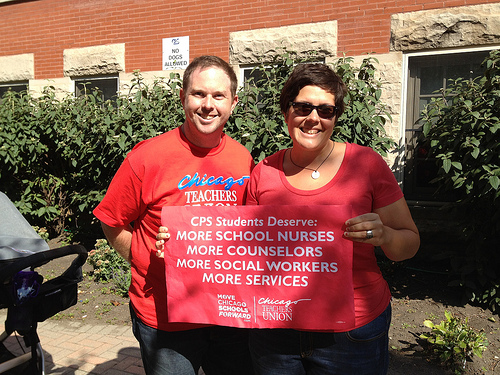
One Voice From The Strike
[flickr id=”7974323437″ thumbnail=”medium” overlay=”true” size=”original” group=”” align=”none”]
Yesterday was the first day of the Chicago Teachers Union strike. I awoke to the sounds of a helicopter circling a picket line near my house and then passed an energetic group of teachers standing outside their elementary school as I biked to work. I watched them cheering as cars honked their horns in support. And I really wanted to ask them what they wanted teachers-in-training to know about the strike and about being a CPS teacher today. I wasn’t sure if what I thought I would hear would be hopeful or cynical, angry or encouraged. I am so excited to report that, on the front lines of this strike, I met passionate, thoughtful, brilliant teachers who expressed a lot of hope to me. It was inspiring to hear them talk so fervently about a career I one day hope to hold. Yes, it is a scary time to be in a teaching program, but it’s also sort of an AMAZING time to be in a teaching program. This is a time of honesty, reflection, and change in not only the Chicago Public School system, but also all over America.
I was very fortunate to find a teacher who would allow me to record a brief interview so I could share just a small snippet of what teachers have to say about the strike. Patrick Clancy is the union delegate for James G. Blaine Elementary School, where he also teaches 7th and 8th grade Mathematics. In just a few short moments, I found a person with whom I share many common ideologies, including the belief that arts are essential and that all students in Chicago deserve an equitable education. These are ideas we discuss at Columbia everyday, and to hear them echoed from a professional in the field was very encouraging. My full interview with him is below.
[flickr id=”7974320976″ thumbnail=”medium” overlay=”true” size=”original” group=”” align=”none”]
What would you want to tell teachers-in-training about the strike?
The general feeling is that we’re taking a stand for public education right now. This goes way beyond compensation issues. We are here to make sure that our schools are equitable and that our students are getting a real education. Over the last decade, we’ve heard a lot about “teaching to the test”. So now we have the opportunity to take advantage of Common Core coming out and the move to a richer, more rigorous curriculum.
We also need to start addressing Art, Music, and P.E., which some people look at as frills or enrichment but that are really part of the basic education that everyone should be receiving. The students at Blaine have Art, Music, and P.E. along with different programs that come in, and we’re very fortunate for that. But we also have to realize that there are so many schools around this city that don’t. It’s a fight for us to hold onto these things, but it’s also a fight for these other schools to make sure they are receiving the basic necessities that we already have. It’s going to be a long fight. I don’t know how long this strike is going to last. But we’re here, we’re digging in, and we need to make a stand.
[flickr id=”7974321526″ thumbnail=”medium” overlay=”true” size=”original” group=”” align=”none”]
What’s something that you wish a first year teacher knew going into the school system, or something that you think is lacking in teacher training that I should be thinking about as I spend my last year observing in classrooms?
There is more to education than math and reading. Our job is so much more than that. Teachers are responsible for character education, and our students’ social and emotional well-being. We do more than just teach kids basic math facts. That stuff is important, but it goes beyond that. What you do as a teacher and the impact you have on a child can’t be measured by a standardized test. We have this whole movement towards more testing, which hopefully we’re going to be moving away from with Common Core. At the same time, they want to start basing evaluations and merit pay all on student test scores. I don’t know where the balance is. I know that there needs to be accountability, but at the same time, there is no one-size-fits-all test that could be used to determine a teacher’s ability. It’s a lack of acknowledgement of all the other factors that go into education. It’s basically saying, “We’re going to choose this one measure and this says everything we need to know about this child, and this says everything we need to know about this teacher.” There needs to be a more realistic way of evaluating these things.
[flickr id=”7974321047″ thumbnail=”medium” overlay=”true” size=”original” group=”” align=”none”]
How has your community of parents responded to the strike?
We feel supported by our community. We know our community supports us as professionals and as educators. We all want the same thing. We all want our kids to be in school. And we all know that the ultimate losers in this our are kids right now. In the short term, our students are out of class, which we don’t want, but our hope is that in the long run our kids our going to benefit from this. It’s hard, because the short term is so hard and so gut wrenching, but we need to know that in the long run this is going to pay off.
[flickr id=”7974322829″ thumbnail=”medium” overlay=”true” size=”original” group=”” align=”none”]
